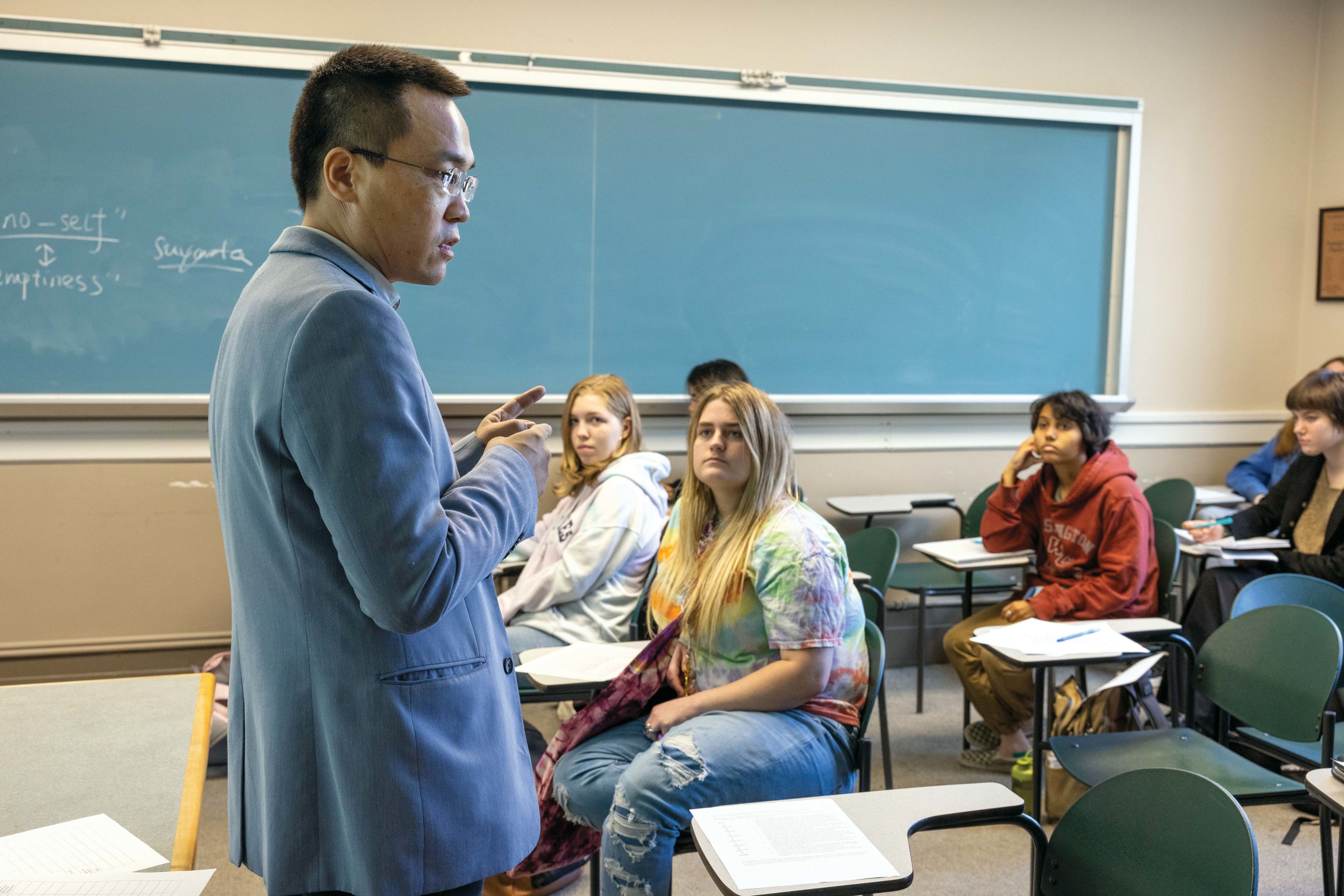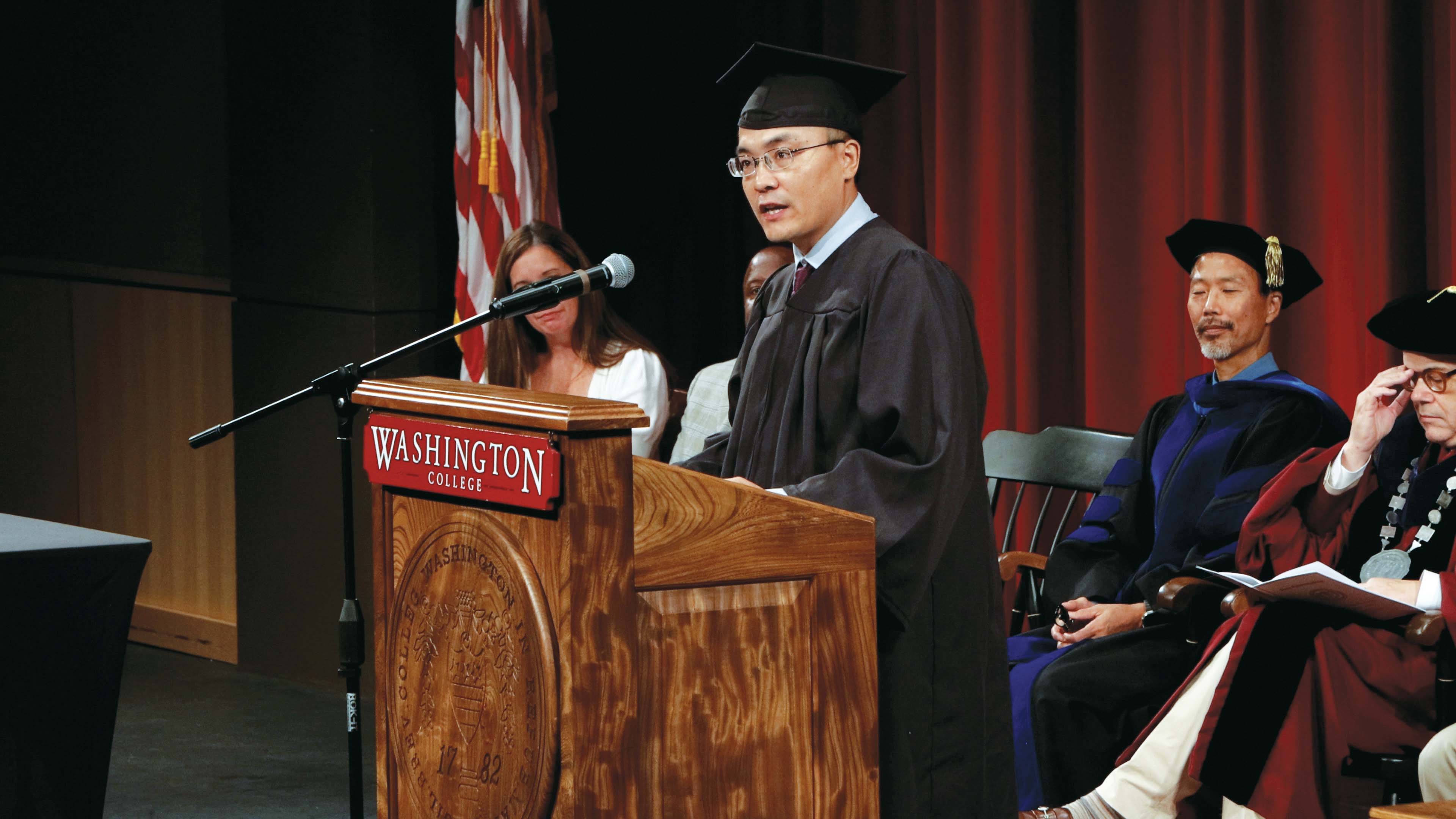Lessons
for Living

Professor structures classes, collaborates with colleagues, and designs syllabuses to model incorporating philosophy and religion into everyday life.
By Mark Jolly-Van Bodegraven
Associate Professor of Philosophy and Religion Bin Song structures his day with care and purpose. He meditates several times each day: between his early-morning scholarly research and writing and taking his daughter to school, around midday, and again before sleep. He very intentionally sets aside enough time for his family, whether it means just being in the same room as them or going on walks in nature together.
He is similarly thoughtful and purposeful in his approach to teaching, deliberately blending two different approaches: philosophy as a way of life and contemplative pedagogy (which originates in religious studies).
At Washington, both disciplines are housed within the Department of Philosophy & Religion. This is unusual in Western higher education, according to Song, which tends to separate the two, viewing philosophy as rigorous analysis in pursuit of truth and religion as concerned with practice that structures human lives. To Song—who has earned doctorates in both disciplines—the combination makes more sense and aligns with tradition and history in both the East and the West.
"In the ancient Greek world, the goal of philosophy was more than intellectual. It was a way of life in the sense that it offered a variety of spiritual exercises to really embody the truth of ideas that had been rigorously investigated by intellect. To embody those ideas was the goal,” Song said. “The goal of philosophy in life is not just to become a rigorous disputant, it's also to become a well-rounded human being that knows how to live, transforming people's personality from an inauthentic state to an authentic state."
Likewise, the Confucian tradition in which Song grew up is concerned with building a society in which all people can achieve their full potential by pursuing their authentic, perfected self. A disciplined self allows the positive structuring of families and society, which in turn allows more people to realize their best selves.
Song brings this perspective to his teaching, which he feels not only benefits from but requires the authenticity he can bring thanks to his own embrace of philosophy as a way of life. He teaches a variety of courses in philosophy and religion, from introductions and historical surveys to comparative courses in Eastern religions and meditation. Song also embraces the liberal arts model by co-teaching courses with colleagues in the departments of English and music.
In the spring 2024 semester, he taught Global Wisdom and Literature with English Department Chair Courtney Rydel, a scholar of medieval literature, for the second time. They developed the course together to broaden students’ exposure to ways of thinking around the world and throughout history (see haikus on p. 64).
“There is definitely a strong cosmopolitan element in both the great Western and great Chinese traditions. In Global Wisdom and Literature, we try to share with students a worldwide compilation of wisdom on living and flourishing, and that is exactly the purpose of a liberal arts education,” Song said. “Although we cherish the idea of cosmopolitanism, we don't want people floating around untethered. They still need to be rooted in one environment, one family, or one cultural lineage. A broad vision and also the very particularly local embodiment of the broader vision need to balance each other. Unless I pursued this type of learning, which is simultaneously cosmopolitan and rooted, I wouldn’t think my life had a good shape.”
Song said that he and Rydel explicitly discuss their approach to teaching with the students so that they understand the value of the time in class and some of the practices they may not be accustomed to. One contemplative pedagogy activity, for instance, starts class with deep listening, in which students pair off and take turns silently listening to each other, then repeating what they understood the other to have said. Much of the reading and even the lectures happen outside of class to allow students to spend class time in discussion or reflection.
These approaches are meant to help students move through three levels of learning: starting with objective understanding of subject matter, then incorporating that knowledge through interpersonal communication, and finally finding ways to apply these new ideas in their own lives, which Song views as the highest level of learning.
“The way we achieve this is to design various contemplative exercises in the classroom so that a student has a space of silence, self-reflection, and mindfulness to deeply ponder, to deeply contemplate the value of the material in their own lives,” Song said. “You must let students have the space and time to do this. In the classroom, you provide opportunities for them to practice this self-reflective study. You must let them gradually open their hearts.”
Song hopes this approach can help to address what he calls
a crisis of mental health in higher education, encouraging as it does students’ integration of valuable insight into their own lives.
His approach to teaching has been recognized by the College with the Alumni Distinguished Teaching Award at the 2023 Commencement ceremony. The winner of the award each year provides the keynote address at the following fall Convocation, which opens the school year. Song spoke to the assembled students, faculty and staff on his view of the liberal arts as uniquely suited to bringing together the world.
"Bin has consistently challenged his students to think more broadly to consider vital but often overlooked aspects of cultures around the world,” President Mike Sosulski said when he introduced him at Convocation. “He has collaborated with colleagues across disciplines and been a champion of fulfilling one of the most important goals that we have in the liberal arts: helping students consider, understand, and engage many different ways of knowing."
Song delivered the keynote address at the
Washington College Fall 2023 Covocation.
Photo by Tim Corrao.
View Bin Song’s Fall 2023 Convocation address,
“The Liberal Arts as a
Cosmopolitan Hope”

